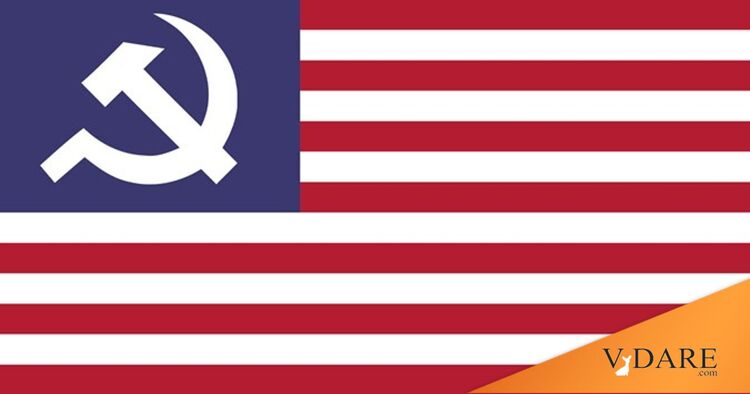In Antiracism We Trust. Walking up to my local chain drugstore, I saw a two-panel notice that I hadn't seen before, pasted on the inside of the automatic glass door.

Left panel, blue letter on white:
To our customers, team members and loved ones whose lives have been affected by discrimination: You will always have a home at Rite Aid.
Right panel, white letters on blue:
"LET ME BE CLEAR: RACISM, INJUSTICE AND INTOLERANCE HAVE NO HOME IN THE RITE AID ORGANIZATION OR IN OUR COMMUNITIES"
 The quote is attributed to Heyward Donigan, President and CEO of Rite Aid.
The quote is attributed to Heyward Donigan, President and CEO of Rite Aid.
"A home"—what? So I can bring a sleeping bag and crash in the Rite Aid storeroom?
"Our communities"—what? You mean the neighborhoods where you are located? How, exactly, shall you police "racism, injustice and intolerance" therein? Foot patrols? Video surveillance?
How long will it be before oaths of allegiance to the Church of Antiracism will be compulsory for any kind of paid employment? (I mean, other than on the faculties of our universities, where such oaths are already compulsory.)
I pledge allegiance to Black Lives Matter, and to the world for which it stands, one community under Antiracism, indivisible, with free stuff and social justice for all, except white supremacists.
How long before witnesses in our courts of law swear their oath on some Antiracist tract?
How long before annual sessions of Congress are opened with Antiracist prayers?
How long before Antiracist slogans are printed on our paper currency and inscribed on the lintels of our public buildings?
Buying ammo. I thought a trip to the range for some rifle practice would be in order. I don't know any better than you do what will happen this November 3rd, but I want to be armed and ready for the worst. I'm low on ammo, though, so off to the local gun store.
They wanted $43 for twenty rounds of .303—more than two dollars a round. Say what? My Lee Enfield is somewhat of an antique, I know, and I don't mind paying premium for the ammo, but that's ridiculous.

Me: "Two dollars a round? That's a bit steep, isn't it?"
He: "You're lucky we have any in stock. We can't get deliveries. Something with the factories."
Me: "Is demand higher than usual?"
He: "Yep, that too."
Me: "How about actual guns? I've been reading about record sales. You been seeing that?"
They, in smiling unison: "Oh yeah!"
I went on the internet, easily found some .303 at one-third the store price; but for purchasers in New York State they'll only deliver to a federally licensed dealer.
Emailed the only friend with an FFL. He's a Late Silent like me, though, cutting down on his commitments, and has given up the business, he told me.
Back to the store. $130 for sixty rounds. Grrr.
The guns of August. So off to the range. Business was good here, too. This was midday on a sunny August Wednesday. Brookhaven Range has thirty-six stations for rifles at 100 and 200 yards, twenty-two stations* for 25 and 50 yards. When I arrived there were four parties waiting to shoot at 100 yards. One told me he'd been waiting half an hour. I waited twenty minutes for a 50-yard station.
This seems to me a good sign. Citizens aren't just buying guns, they're learning to use them.
Would the range require a mask? I wondered as I drove in. Yes, they did, according to a notice at the entrance.
Compliance was patchy, though. There was a twentysomething couple at the station next to mine. He wore a mask most of the time; she didn't wear one at all, just went bare-faced the whole time I was there. The range officers didn't seem to care. (And I was pleasantly surprised, not for the first time, to note how many hot young women you see at the range.)
At first I tried shooting with a mask on, assuming that the range officers might be less tolerant of me than they were of Suzy Creamcheese in the adjacent bay. I couldn't make it work, though. For one thing, the mask messed up my breathing rhythms somehow. In shooting, as in swimming, you have to breathe right.
For another, my glasses kept fogging up. The ingenuity of man seems not yet to have devised a breathing mask that doesn't fog up eyeglasses. How on earth do surgeons manage in the OR, stitching veins and nerves together with fogged-up glasses? (I asked a medical friend. He: "The surgeon has a nurse standing by him just to wipe his glasses clear." Really? Come on.)
So I fired my last twenty rounds with mask down under chin. No one seemed to mind.
——————————
* Not twenty as advertised. Have they been expanding to meet increased demand? Let's hope so, but I didn't think to ask.
Mask rage. That insouciance at the range keys in to the way mask-wearing has been politicized, like every other damn thing nowadays. Masks are virtuously woke; going maskless is dissident, probably white supremacist.
I wear a mask when required to—at the range, the Post Office, the stores—but not otherwise. I don't, for instance, wear a mask when walking my dog around my quiet suburban neighborhood. When I meet people walking towards me, I call out a cheery greeting. Of those who are masked, most will greet me back; but from others I get back only silence and an angry glare from over the mask. The signal I'm reading is: Wear a damn mask, you fascist!
Mask rage is already a thing, and has generated acts of violence, at least in England. There have already been two mask rage fatalities in North America, one in Michigan (blacks), one in Minden, Ontario, Canada: elderly rural white male.
Man-management secrets. Heading out the door to the range, I reminded my lady of the old wife's advice to a young wife on how to keep a man happy: "Let him get drunk once in a while, let him shoot guns once in a while."
She: "Drunk once in a while? Ha! The rate you scarf down the bourbon?"
That is very unfair. Perhaps I have been taking one too many nightcaps recently; but hey, what's more important than a good night's sleep? And if the definition of an alcoholic is someone who drinks liquor before breakfast, I am not even close. I never drink liquor before dinner, except when visiting and pressed by hosts. I don't want to be a bad guest, do I?
And I always thought the old wife left out the most important part of her advice: "… but not both at the same time."
Hurricanes, real and imaginary. My sympathy to the unfortunate residents of Louisiana and Texas who found themselves in the path of Hurricane Laura on August 26th. A 20-ft storm surge? Hoo-ee.
If it's any consolation, it could have been a lot worse. Here's a New York Times story from four years ago.
Imagine a hurricane, a hurricane like Matthew, aimed straight at the heart of the American petrochemical industry.
Isaiah whirls through the sky, gathering strength from the Gulf of Mexico's warm waters. Beach towns are evacuated. Citizens and companies in Texas' petro-industrial enclaves from Bayou Vista to Morgan's Point are warned: Prepare for the worst …
Isaiah's monstrous arm reaches across the bay toward Houston, some 50 miles inland, adding water to water, and when it smashes into the Exxon Mobil Baytown refinery, the storm surge is over 25 feet high. It crashes through refineries, chemical storage facilities, wharves and production plants all along the Houston Ship Channel, cleaving pipelines from their moorings, lifting and breaking storage tanks.
As Isaiah passes inland, the iridescent, gray-brown flood rises, carrying jet fuel, sour crude and natural gas liquids into strip malls, parks, schools and offices. More than 200 petrochemical storage tanks have been wrecked, more than 100 million gallons of petroleum and chemicals spilled. Damages for the region are estimated at more than $100 billion. More than 3,500 are dead. It is one of the worst disasters in United States history …
The good news is that Isaiah hasn't happened. It's an imaginary calamity based on research and models. The bad news is that it's only a matter of time before it does.
[When the Next Hurricane Hits Texas, by Roy Scranton; New York Times, October 7th, 2016].
The way things have been going in 2020, I wouldn't have been surprised if we'd been visited by a horror on the scale of Isaiah. Laura was bad enough, though, goodness knows. My sympathies again to those afflicted.
No power to deliver. We Long Islanders didn't get Isaiah, but we did get Isaias, barreling in on August 4th, with top wind speeds over 70 mph. Tree branches came down; entire trees came down; they brought the utility wires down with them; in a few places the utility poles themselves came down—one of them on top of a parked car in the next street to mine. Power and cable were out for four days.
All the grumbles I emitted in my April Diary apply again. Overhead utility wires, in a heavily wooded area, strung on utility poles that are allowed to get wormy and rotten? Isn't this supposed to be a First World country? We can put men on the Moon, can't we? Oh wait; actually we can't, not any more. So … never mind.
But, "Isaias"? What kind of name is that? I had to look it up. It's the Latin form of "Isaiah." Apparently the names awarded to hurricanes, even imaginary ones, can only be used once. Since "Isaiah" and "Isaias" are basically the same name, like "Jack" and "Jacques," it seems to me the meteorologists are cheating here, but no doubt they can make a case.
"Isaiah" is anyway apt for trying to find out when the utility companies would have us back in service.
Wherefore, when I came, was there no man? when I called, was there none to answer? Is my hand shortened at all, that it cannot redeem? or have I no power to deliver? [Isaiah 50.ii.]
And I cannot forbear reporting with smug pride that the Derbyshire treehouse, now in its seventeenth year, emerged from the storm intact and unscathed. I build for the ages.
A miserable war. Chatting with a friend who knows a lot about the Korean War, I was made aware that I don't. That's mildly embarrassing, considering that my father-in-law fought in that war … on the other side.
 After asking around for recommendations I settled on Fehrenbach's This Kind of War, first published 1963. The author, the book jacket tells me, "commanded U.S. Army units in Korea at platoon, company, and battalion levels."
After asking around for recommendations I settled on Fehrenbach's This Kind of War, first published 1963. The author, the book jacket tells me, "commanded U.S. Army units in Korea at platoon, company, and battalion levels."
It shows. Fehrenbach's accounts of military actions convey a vivid sense of what happened in mid-20th-century battles. His diversions into political and diplomatic events, although of course essential to the story line, are less gripping; but I couldn't skip a page.
What a wretched, miserable war it was! What made it so was, that the Allies didn't want to win it, they only wanted not to lose it—to restore the prewar status of a Korea divided between communist North and free South.
There were excellent geostrategic and political reasons for this half-heartedness.
- Geostrategic: This was the first big conflict of the Atomic Age. The U.S.A. could not be sure how the U.S.S.R. would react to a crushing defeat for their Korean puppet regime. Action in Europe? Nuke strikes on the South?
- Political: Just five years after WW2, Americans had no stomach for major mobilization on behalf of a small, distant country whose affairs did not directly concern us. Draftees slouched off reluctantly to Korea, and there were few enthusiastic volunteers.
Within those constraints, I don't see how we could have done other than what we did. It made the war mighty frustrating for our troops, though. Once things stabilized after the great retreats and advances of the first few months, our guys were stuck in a WW1-type stalemate; but with the difference that while the two sides on the Western Front were well matched, the Allies in Korea faced an enemy far inferior in every kind of technology.
It didn't help morale at all that, as Fehrenbach tells us in Chapter 32: "Everything in Korea happened at night." With the Allies totally dominating the skies, that was the only time the communists could conduct movements without being strafed, bombed, and napalmed to oblivion. Korea wasn't just a miserable, frustrating war for our troops; it was miserable and frustrating in the dark.
Of the situation in late 1951, the author writes:
It was now, not openly, but in mess tents and private gatherings along the brooding lines of entrenchments, that some men began to say, "MacArthur was right."
It's possible he was (he wanted to actually win, at the risk of WWIII) but it was not possible, strategically or politically, for Truman to take the chance of MacArthur being wrong.
A gripping story, a worthwhile read, but …
(1) T*H*E*R*E A*R*E N*O M*A*P*S!!! Who the hell publishes a book about a major military campaign without including a single map? Brassey's, that's who. This should be a felony.
(2) The text is not edited. Having written books myself, I'm tolerant of the occasional blooper. Some of Fehrenbach's are common enough to raise no more than a weary sigh. I've long since reconciled myself to the fact that I am the last living human being that knows how to spell "Attlee," for instance, and one of the last few that knows the difference between the words "affect" and "effect."
The quantity of errors in this 1994 Brassey's edition—31 years after the book's first publication!—is shameful, though. Three decades in print, and no publisher saw fit to correct horrors like this:
But what the editors of Time believed, and what was truth, were, as it so often is, two different things. [P. 253.]
The war without a song. One indicator of the low spirits in which the Allies fought that war is, there is no Korean War song.
Every war with any enthusiasm at all behind it has a song. When I was a kid, the oldest living cohort of big-war veterans in England were those of the Boer War of 1899-1902. Any one of them could sing you a couple of verses of "Goodbye, Dolly Gray." (Over here, I am told, that same song accompanied the Spanish-American War.) Dang, I heard it so often I can sing the chorus myself unprompted.
For WW1 the Brits had "Keep the home fires burning," while America had "Over there": a telling contrast between the mist of melancholy that, to some degree or other, hangs over all English cultural productions, and the cheery youthful bumptiousness of the early 20th-century U.S.A.
By WW2 the radio and gramophone were universal. You can get an argument going about which song was the song characteristic of that war. I'd say it's a toss-up between "I'll be seeing you" and "Lili Marlene." The latter was popular on both sides of the conflict—a thing that, so far as I know, never happened before and has never happened since.
But Korea? I just scanned the Top Thirty hits for 1950-53. Some great songs there, but nothing that really prompts the thought: "Oh yeah, the Korean War."
Vietnam was almost as miserable a war as Korea, but at least we had Country Joe and the Fish.
Fiction of the month. Also military.
A few years ago I read and much enjoyed William Boyd's 1981 novel A Good Man in Africa, from which a movie (Sean Connery, Diana Rigg) was made.
 I meant to follow up and read more of Boyd's fiction, but never did. Then this month, prompted by a chance reference to Boyd in some news story, I impulse-bought his second novel, An Ice-Cream War, which is about WW1 fighting in East Africa.
I meant to follow up and read more of Boyd's fiction, but never did. Then this month, prompted by a chance reference to Boyd in some news story, I impulse-bought his second novel, An Ice-Cream War, which is about WW1 fighting in East Africa.
Remember that Germany participated enthusiastically in the late-19th-century colonial carve-up of Africa. Their biggest resulting possession was German East Africa, "nearly double the size of Germany," according to the 1911 Britannica. Nowadays this land, plus the Zanzibar islands, is the nation of Tanzania.
German East Africa had a 400-mile border on the north with British East Africa (nowadays Kenya); so when WW1 broke out in 1914, there was bound to be trouble. That's the background to the story.
An Ice-Cream War is not such boisterous fun as A Good Man in Africa, but Boyd knows the landscape well—he grew up in Africa—and he keeps a strong narrative thread going. He is very good on the messiness of life: how things—business ventures, wedding nights, battles—hardly ever work out the way the participants expected.
This is especially the case with battles, of course. It is not at all a coincidence that we owe the acronym "SNAFU" to the military. (Along with some lesser-known variants like "JANFU"—the all-too-common result of a joint Army-Navy operation.) Having just finished Fehrenbach's history of the Korean War, I was nicely primed for this.
And Boyd's novel, unlike Fehrenbach's history, has a map!
Manual labor. Back when I learned computer languages for a living, I approached each new one on the same schedule:
- Get some fairly clear idea what kind of task or tasks you want to code for.
- If possible (it wasn't always) find a primer text with some simple examples you could try out.
- Get The Manual—a full reference, containing everything you might ever need to know about the language.
- Start coding.
More than once over the past few years I have made a resolution to get my coding skills up to date, without much of a follow-through. With this latest resolution, though, taking on the C# (pronounced "c-sharp") language, I have at least advanced to the Manual stage.
- My task: Just some basic file processing and string manipulation, mainly to get my personal website in better shape.
- My primer: Jamie Chan's Learn C# in One Day. Simple and straightforward, although I seriously doubt that anyone coming completely cold to programming could absorb it in one day. On the upside, my inner reactionary is glad to know that the application of choice for beginners is still a payroll program, just as it was fifty years ago.
- My manual: I am now the proud owner of Albahari and Johannsen's C# 8.0 in a Nutshell. This is one heck of a nutshell: over a thousand small-print pages of description and definition. Thread pools! Jagged arrays! Coarse-grained concurrency! Lazy quantifiers!
This should be fun.
Math Corner. Math is now fully woke.
From the current (August/September 2020) issue of MAA Focus, newsmagazine of the Mathematical Association of America, page 12:
Resources for learning how to be an anti-racist
edited by Jacqueline Jensen-Vallin
As a community we are finally starting to hear more clearly the voices of our BIPOC colleagues. One of the many things that I have heard is that to dismantle the implicit and explicit racism in our academic institutions and workplaces, we need white colleagues to do their share of the work …
And so on and driveling on for a full page and a quarter.
The MAA isn't the only game in town. Here is the current (September 2020) issue of Notices of the American Mathematical Society.
Once past the table of contents and masthead, the first page of any interest is Letters to the Editor. The first letter is from one William Yslas Vélez, Emeritus Professor of Mathematics at the University of Arizona.
The video of Mr. George Floyd dying on the street is too difficult to watch yet its impact has been profound. Academia needs to reflect on this incident …[Letter to the Editor: Recognize Professional Privilege, August 1, 2020]
And so on and driveling on for 300 words.
To be fair to these journals, there is actually some math in both of them. They are not cover-to-cover Antiracism. Not yet.
No brainteaser this month, just a note on the Collatz Conjecture.
Everyone knows that there are longstanding open problems in math: statements of mathematical fact that no-one has been able to either prove or disprove. Most of them are too abstruse for non-mathematicians to understand without a patient and friendly guide. A few, however, concern nothing more than basic arithmetic.
Probably the most famous of these is the Goldbach Conjecture:
Every even number greater than two is the sum of two primes.
The Goldbach Conjecture is dear to my heart because Prof. Estermann, who taught us analysis at University College, London, had made his name in math many years previously by proving that almost every even number greater than two is the sum of two primes. (There is a rigorous mathematical definition of that word "almost.")
The Collatz Conjecture is even more simply arithmetical. You don't even need to know what a prime number is.
Think of a positive whole number. If it's even, divide it by two; if it's odd, multiply it by three and then add one.
Whatever number you got from doing that, perform the same process on it.
Keep doing this. Sooner or later your answer will be one.
So if, for example, you start with 17 you get 52, 26, 13, 40, 20, 10, 5, 16, 8, 4, 2, 1.
(Once you have arrived at one, you are forever after stuck in the cycle 4, 2, 1, 4, 2, 1, 4, 2, 1, …)
For worldwide fame you must of course prove rigorously that this will always be true; or at least, in the spirit of Teddy Estermann, that it will almost always be true.
This month's news story is that Marijn Heule, a computer scientist at Carnegie Mellon University, thinks he can prove the Collatz Conjecture using a computerized technique called "satisfiability solving." No, I won't try to explain it, because I don't understand it; read the news story for yourself if you're inclined.


 John Derbyshire [
John Derbyshire [








